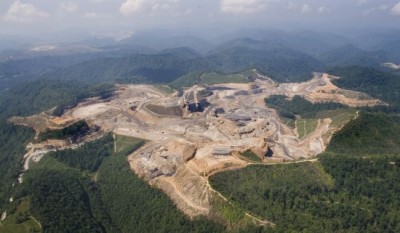A historic reckoning is taking place on Coal River in West Virginia this week-and in Washington, DC on Thursday.
On June 25th, U.S. Senator Benjamin L. Cardin (D-MD), Chairman of the Senate Environment and Public Works Water and Wildlife Subcommittee, will hold the first bipartisan hearing in a generation to address the impact of mountaintop removal mining operations.
In the meantime, the human rights and constitutional violations of American citizens besieged by ruthless outside coal companies will be on full display to the national media and the nation-from the shocking and shameful mountaintop removal operations threatening the safety of a school and community in West Virginia, to the transformed halls of the US Congress.
On Tuesday, June 23rd, local coalfield parents and residents will be joined by legendary 88-year-old West Virginia activist Winnie Fox, 94-year-old coal mining hero and former US Congressman Ken Hechler (D-WV), the nation’s foremost climatologist James Hansen, actress and long-time environmental activist Darry Hannah, and director Michael Brune of the national environmental group Rainforest Action Network, on a nonviolent march from Marsh Fork Elementary School in Sundial, West Virginia to a nearby Massey Energy mining site to call attention to the blatant disregard for the safety of the children and community.
The two sides of the Massey bridge over Coal River could not be more distinct-and a startling wake-up call to the nation.
Marsh Fork Elementary School in Sundial, West Virginia might be the most tragic and symbolic site of American children left behind by their state government.
Forsaken by state officials and a recent WV Supreme Court decision last week, the school and its children must play amid the toxic dust of a coal silo-and soon a second one-that sits less than a football field away.
The Marsh Fork Elementary School also sits only a few football fields downslope of a 2.8 billion gallon earthen coal sludge impoundment, where Massey Energy is setting off thousands of pounds of explosives near the dam.
Every school kid in the coalfields knows Massey’s reckless history with coal sludge dams.
In a haunting parallel to last December’s TVA coal ash disaster, a Massey subsidiary in eastern Kentucky was responsible for the largest coal slurry spill at that point, leaking over 300 million gallons of toxic sludge into the area’s waterways and aquifers.
With blasting nearby, if the 380 foot earthen dam above the Marsh Fork school broke, the children and community residents would have less than three minutes to flee.
Based in Richmond, Virginia, Massey Energy has demonstrated a merciless coveting for coal at any expense. At the 2008 4th quarter earnings call, the out-of-state company’s president crowed that 2008 was the “most successful” in Massey’s history, and their “very aggressive expansion plan” was executed “almost to perfection.” The Virginia-based president was “especially pleased” that Massey reached an “all time record high” of $641 million in adjusted annual EBITDA.
Now laying off workers due to market demands, with 19 union-busted Appalachian mining operations valued at $2.6 billion in 2008, the Richmond company shelled out $20 million in penalties for dumping toxic mine waste into the region’s waterways in 2008; Massey also paid a record $4.2 million for civil and criminal fines in the death of two coal miners in West Virginia last year.
Besides the obvious environmental tragedy of destroying over 500 American mountains and 1,200 miles of streams through massive explosives and mining waste, four other issues should be noted by the national media:
1) Mountaintop removal is a national issue, not a regional or Appalachian issue: Coal stripmined from mountaintop removal operations in Appalachia-though accounting for only 5-7% of the national coal production-is used by coal-fired plants that generate electricity for Americans across the nation, including the network and cable TV channels in NYC, the White House in Washington, DC, Disney World in Orlando, Florida, and Wrigley Field in Chicago.
2) Mountaintop removal is an international climate change issue: Over 500 massive mountains and 1.5 million acres of hardwood deciduous forests have been clear cut and blown to bits in one of our continent’s most important carbon sinks; and the coal exported from mountaintop removal operations, including millions of tons to dirty coal-fired plants in China, contribute to our growing carbon dioxide emissions climate crisis.
3) Mountaintop removal is a national health care issue: When entire communities in the coalfields are unable to drink their well water or tap water, and entire areas such as Prenter, West Virginia, are afflicted with various illnesses or some form of gallbladder disease from coal slurry contaminated water, our nation must come to grips with this health care emergency. According to a recent report by the University of California in Santa Barbara, the external costs of US coal-fired plants (“harm that comes about by damages to crops and buildings as well as health implications for humans-sulfur dioxide, nitrogen oxides, particulate matter”) add $268 billion annually to our nation’s health care system burden.
4) Mountaintop removal is a national human rights issue: As 3.5 million pounds of ammonium nitrate/fuel oil explosives continue to be detonated across the West Virginia mountains every day (with a similar amount ripping across eastern Kentucky, eastern Tennessee and southwestern Virginia), American citizens living under or near mountaintop removal operations have been subjected to a state of terror, including daily blasting, dangerous bombardments of fly rock, rain showers of silica dust and heavy metals, contamination of their water sources, flooding, harassment, and the massive devaluation of their properties.
In announcing the historic Senate hearings last week, on the same day that the Obama administration set forth its intent to do “all it can under existing laws and regulations to curb the most environmentally destructive impacts of mountaintop coal mining,” Sen. Carden said: “Mountaintop mining is one of the most destructive practices that already has destroyed some of America’s most beautiful and ecologically significant regions. Today’s decision by the Obama Administration to limit the practice through a stronger review of mountaintop mining permit applications is an important step in the right direction. However, it does not halt this incredibly destructive form of mining. We must put an end to this mining method that has buried more than a thousand miles of streams.”
Senator Cardin is the sponsor of S. 696, The Appalachian Restoration Act, a two-page bill that would outlaw the mining practice.
As bridge between the Congressional hearings on Thursday and the march from Marsh Fork Elementary School on Tuesday, 94-year-old former West Virginia Congressman Ken Hechler will be in the front ranks.
Hechler held the first hearing on the impact of mountaintop removal in 1971. Later that year he introduced a bill to abolished strip-mining. When the House amendment to grant federal sanctioning to mountaintop removal under the Surface Mining Control and Reclamation Act was introduced on July 22, 1974, Ken Hechler rose and declared:
“Mountaintop removal is the most devastating form of mining on steep slopes. Once we scalp off a mountain and the spoil runs down the mountainside and the acid runs into the water supply, there is no way to check it. This is not only esthetically bad as anyone can tell who flies over the State of West Virginia or any place where the mountaintops are scraped off, but also it is devastating to those people who live below the mountain. Some of the worst effects of strip mining in Kentucky, West Virginia, and other mountainous areas result from mountaintop removal. McDowell County in WV, which has mined more coal than any other county in the Nation, is getting ready right now to strip mine off four or five mountaintops. They are displacing families and moving them out of those areas because everybody down slope from where there is mountaintop mining is threatened. I certainly hope that all the compromises that have been accepted by the committee, offered by industry in the committee, that now we do not compromise what little is left of this bill by amendments such as this.”
Let’s hope Hechler’s voice-and those of the children and other coalfield residents in Coal River Valley, and around Appalachia-will be heard this time.




